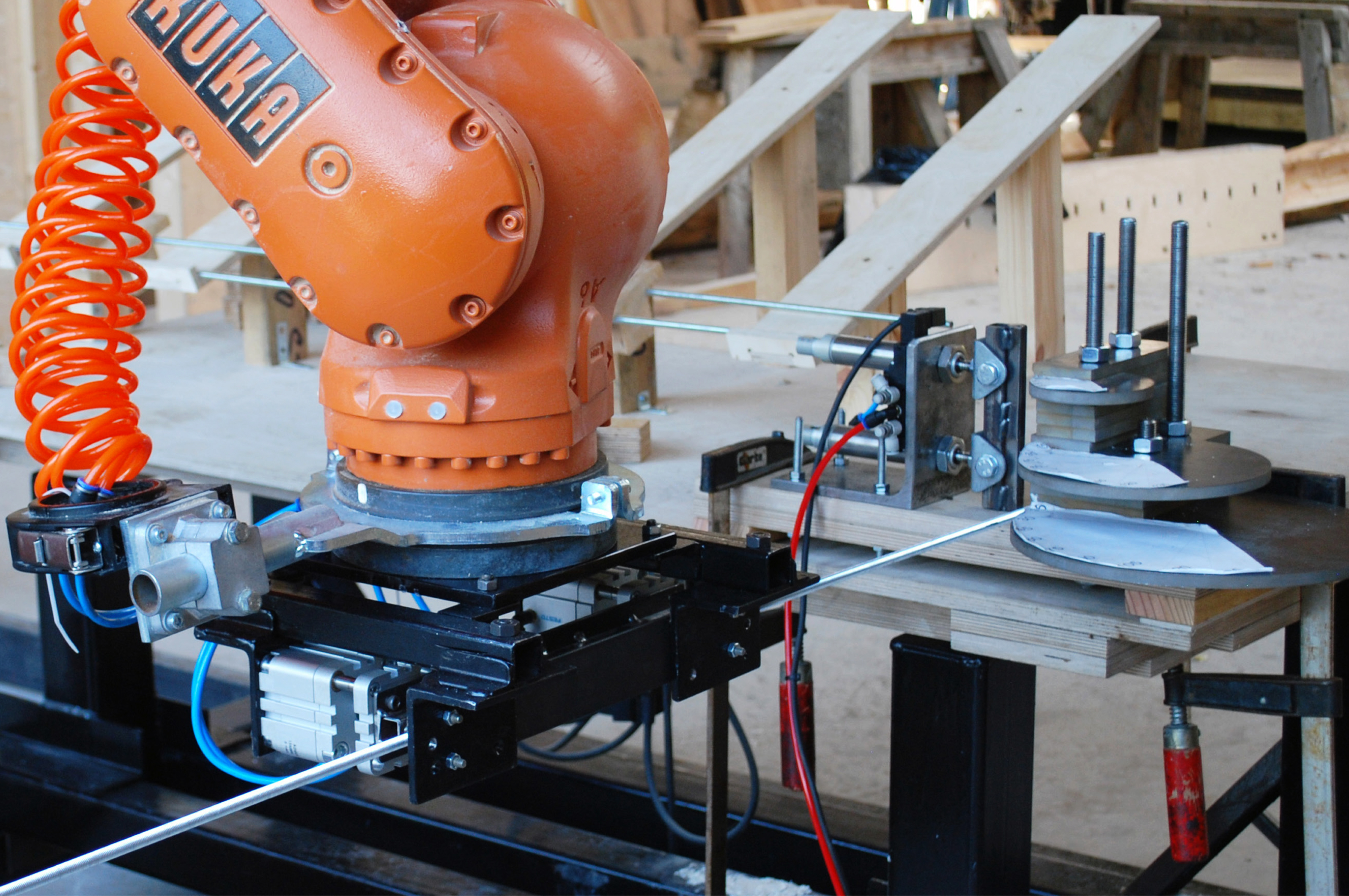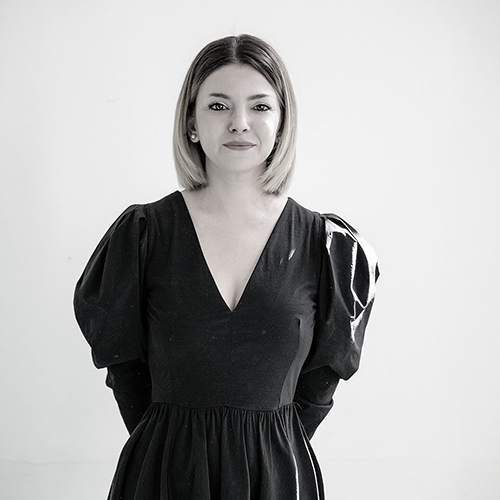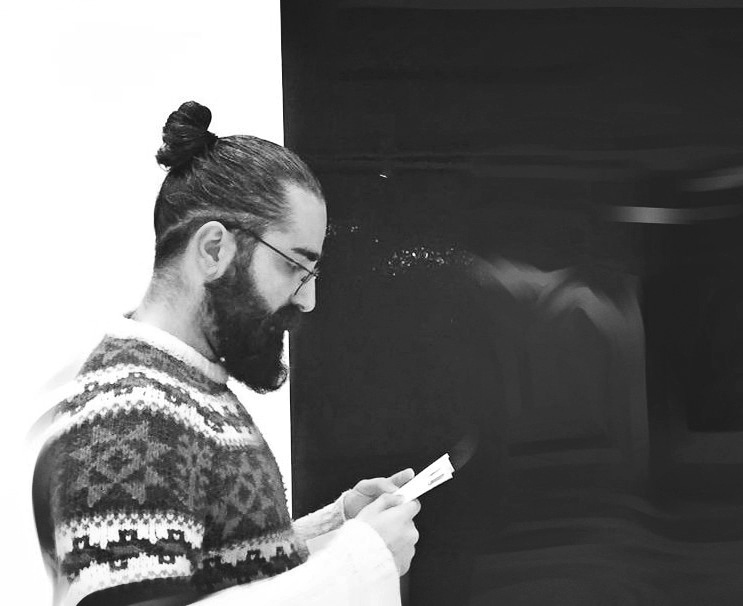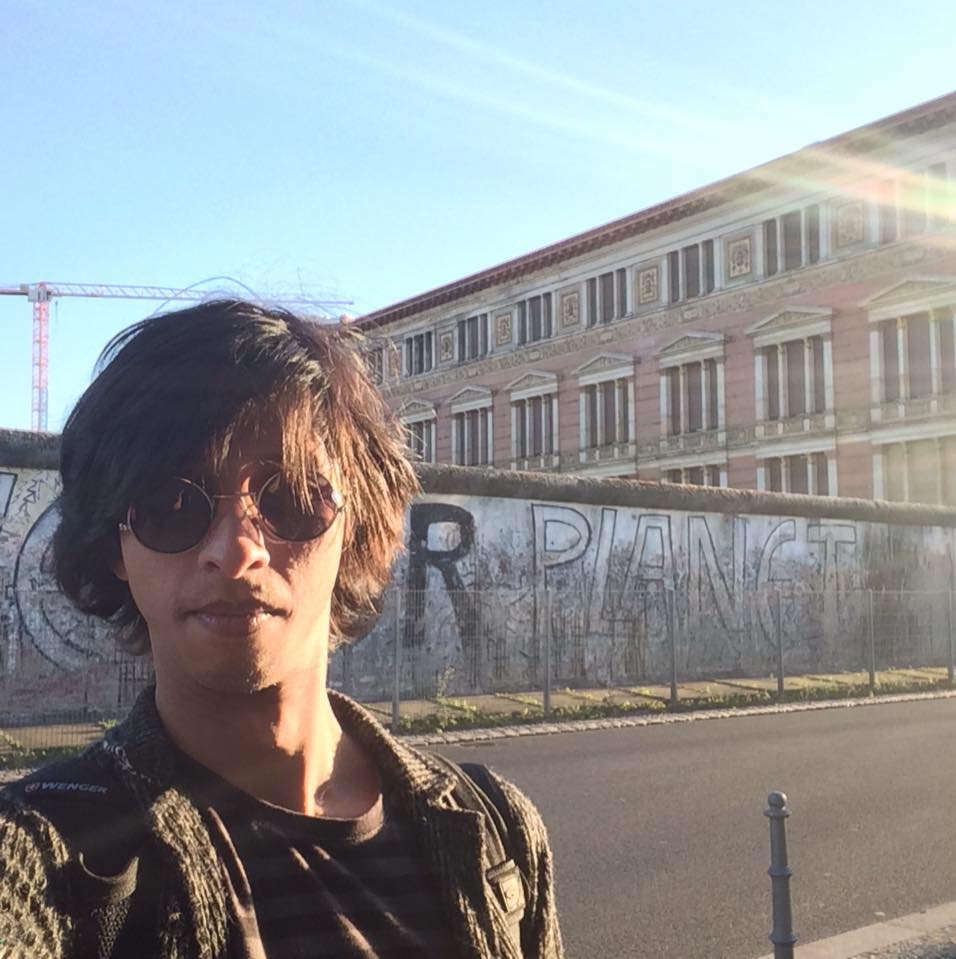Fabrication | Online Workshop | English | Europe-Mideast-Africa
Description:
Fabricating Complexity will introduce participants to the research carried out by EmTech on robotic fabrication and design. We are going to explore the themes of generative design, material computation, and robotic fabrication processes during this 5-day workshop. Our design brief is going to be geared towards the production of a three-dimensionally interwoven spatial enclosure. This task will be investigated through a combination of structural, morphological, and contextual factors which our design intervention will be expected to respond to differentiate its material and geometrical organization.
Computational generative form-finding methods will set the correlations between the digital process of design with the physical world of fabrication and materiality. Each session will be structured to present participants to some of the key computational techniques employed in generative form-finding, multi-objective optimisation, robotic tool-path planning, and material intelligence. Seminars on algorithmic workflows, with a particular emphasis on physics simulations and aggregation-based modelling processes, are going to introduce participants to the fundamental concepts of computational form-finding and simulation. Grasshopper and its various add-ons are going to be employed for the generation of advanced computational models with various levels of complexity. These models are going to be further developed into geometrical configurations, and they will be optimised via multi-objective optimisation for geometrical, physical, and spatial parameters. Robotic toolpaths for rod bending are going to be generated to design and optimise fabrication workflows.
Rod bending methods in traditional manufacturing industries are well-documented and established for their effectiveness and precision. This process sets up a set of constraints which have direct feedback on the computational form-finding process. Our workflows will explore the evaluation and interpretation of traditional fabrication processes towards their advancement within the domain of computational form-finding, analysis, and robotic tool path generation protocols.

Key Words:
Robotic fabrication,Robotic rod-bending,Computational form-finding,Geometry optimization
Required Skills:
Intermediate Grasshopper, Intermediate Rhino
Required Software:
Rhinoceros, Grasshopper
Required Hardware:
Laptop
Maximum number of participating students:
12
Computational generative form-finding methods will set the correlations between the digital process of design with the physical world of fabrication and materiality. Each session will be structured to present participants to some of the key computational techniques employed in generative form-finding, multi-objective optimisation, robotic tool-path planning, and material intelligence. Seminars on algorithmic workflows, with a particular emphasis on physics simulations and aggregation-based modelling processes, are going to introduce participants to the fundamental concepts of computational form-finding and simulation. Grasshopper and its various add-ons are going to be employed for the generation of advanced computational models with various levels of complexity. These models are going to be further developed into geometrical configurations, and they will be optimised via multi-objective optimisation for geometrical, physical, and spatial parameters. Robotic toolpaths for rod bending are going to be generated to design and optimise fabrication workflows.
Rod bending methods in traditional manufacturing industries are well-documented and established for their effectiveness and precision. This process sets up a set of constraints which have direct feedback on the computational form-finding process. Our workflows will explore the evaluation and interpretation of traditional fabrication processes towards their advancement within the domain of computational form-finding, analysis, and robotic tool path generation protocols.

Schedule:
Jun 27 - Jul 1
-
Day 1 / Jun 27
-
Day 2 / Jun 28
-
Day 3 / Jun 29
-
Day 4 / Jun 30
-
Day 5 / Jul 1
Instructors:
-
 Elif Erdine Architectural Association (AA) School of Architecture,Programme Head, Emergent Technologies & Design (EmTech) Post-Graduate ProgrammeElif Erdine is an architect, designer, and researcher. She is the Director at Emergent Technologies and Design Post-Graduate Programme (EmTech), at the Architectural Association (AA) School of Architecture. The research agenda of EmTech focuses on investigating new synergies of architecture and ecology through the critical intersection of computational design and fabrication. During 2010-2015, Elif Erdine conducted her PhD at the Architectural Association PhD in Design Programme, titled ‘Generative Processes in Tower Design: Algorithms for the Integration of Tower Subsystems’, under the advisory of Dr. George Jeronimidis, Dr. Michael Weinstock, and Patrik Schumacher. Since 2010 she has been directing and teaching in various AA Visiting School programmes (AA Istanbul VS, AA Summer DLAB), exploring generative design techniques, integration of algorithmic design methods with large-scale digital fabrication tools. She has worked for Zaha Hadid Architects during 2006 - 2010. She received her B.Arch. degree from Istanbul Technical University in 2003 (High Honors), and M.Arch. degree from the AA Design Research Lab (AA DRL) in 2006 (Project Distinction).She has published and presented her research in Design Studies, eCAADe, CAAD Futures, SimAUD, and ACADIA, among others. Website: https://emtech.aaschool.ac.uk/ https://summerdlab.aaschool.ac.uk/ https://istanbul.aaschool.ac.uk/ LinkedIn: https://www.linkedin.com/in/elif-erdine-phd-1a565ab/ Google Scholar: https://scholar.google.com/citations?user=-YP3R-oAAAAJ&hl=en
Elif Erdine Architectural Association (AA) School of Architecture,Programme Head, Emergent Technologies & Design (EmTech) Post-Graduate ProgrammeElif Erdine is an architect, designer, and researcher. She is the Director at Emergent Technologies and Design Post-Graduate Programme (EmTech), at the Architectural Association (AA) School of Architecture. The research agenda of EmTech focuses on investigating new synergies of architecture and ecology through the critical intersection of computational design and fabrication. During 2010-2015, Elif Erdine conducted her PhD at the Architectural Association PhD in Design Programme, titled ‘Generative Processes in Tower Design: Algorithms for the Integration of Tower Subsystems’, under the advisory of Dr. George Jeronimidis, Dr. Michael Weinstock, and Patrik Schumacher. Since 2010 she has been directing and teaching in various AA Visiting School programmes (AA Istanbul VS, AA Summer DLAB), exploring generative design techniques, integration of algorithmic design methods with large-scale digital fabrication tools. She has worked for Zaha Hadid Architects during 2006 - 2010. She received her B.Arch. degree from Istanbul Technical University in 2003 (High Honors), and M.Arch. degree from the AA Design Research Lab (AA DRL) in 2006 (Project Distinction).She has published and presented her research in Design Studies, eCAADe, CAAD Futures, SimAUD, and ACADIA, among others. Website: https://emtech.aaschool.ac.uk/ https://summerdlab.aaschool.ac.uk/ https://istanbul.aaschool.ac.uk/ LinkedIn: https://www.linkedin.com/in/elif-erdine-phd-1a565ab/ Google Scholar: https://scholar.google.com/citations?user=-YP3R-oAAAAJ&hl=en -
 Milad Showkatbakhsh Architectural Association (AA) School of Architecture,Studio Master at Emergent Technologies and Design (EmTech) Postgraduate ProgrammeMilad is the Studio Master of Emergent Technologies and Design Postgraduate Programme (EmTech) at the Architectural Association School of Architecture (AA) in London, where he is a doctoral candidate under Dr Michael Weinstock’s directorship as well. He holds BSc. in Architectural Engineering from Shahid Beheshti University and M.Arch. from Pratt Institute, where he graduated with Sidney Katz award for design excellence in 2015. Milad has worked for several architecture and design firms in Asia, U.S.A and Europe as a design technology specialist, such as Contemporary Architecture Practice (CAP), Led by Ali Rahim and Hina Jamelle. His research has been published in peer-reviewed journals and conferences such as the International Journal of Architectural Computing, Journal of Computational Design and Engineering and Computer-Aided Design and Applications journal. Milad is the co-director of the AA Istanbul visiting school with the research focus on the integration of algorithmic design methods with large-scale digital fabrication tools. He is the co-founder of ‘Wallacei’, an evolutionary and analytic engine with embedded machine learning algorithms that gives users full control over their evolutionary simulations in Grasshopper 3D. Milad’s research interest is the application of biological principles of intelligence in architecture and urban design through computational processes. -- https://emtech.aaschool.ac.uk/ -- https://istanbul.aaschool.ac.uk/ -- https://www.mi-sh.com/home -- https://www.wallacei.com/ -- https://www.linkedin.com/in/miladshowkatbakhsh/ --
Milad Showkatbakhsh Architectural Association (AA) School of Architecture,Studio Master at Emergent Technologies and Design (EmTech) Postgraduate ProgrammeMilad is the Studio Master of Emergent Technologies and Design Postgraduate Programme (EmTech) at the Architectural Association School of Architecture (AA) in London, where he is a doctoral candidate under Dr Michael Weinstock’s directorship as well. He holds BSc. in Architectural Engineering from Shahid Beheshti University and M.Arch. from Pratt Institute, where he graduated with Sidney Katz award for design excellence in 2015. Milad has worked for several architecture and design firms in Asia, U.S.A and Europe as a design technology specialist, such as Contemporary Architecture Practice (CAP), Led by Ali Rahim and Hina Jamelle. His research has been published in peer-reviewed journals and conferences such as the International Journal of Architectural Computing, Journal of Computational Design and Engineering and Computer-Aided Design and Applications journal. Milad is the co-director of the AA Istanbul visiting school with the research focus on the integration of algorithmic design methods with large-scale digital fabrication tools. He is the co-founder of ‘Wallacei’, an evolutionary and analytic engine with embedded machine learning algorithms that gives users full control over their evolutionary simulations in Grasshopper 3D. Milad’s research interest is the application of biological principles of intelligence in architecture and urban design through computational processes. -- https://emtech.aaschool.ac.uk/ -- https://istanbul.aaschool.ac.uk/ -- https://www.mi-sh.com/home -- https://www.wallacei.com/ -- https://www.linkedin.com/in/miladshowkatbakhsh/ -- -
 Abhinav Chaudhary EmTech, Architectural Association School of Architecture,TutorAbhinav Chaudhary is an architect and musician from New Delhi, India currently employed at PLP Architecture in London as a Computational Design specialist. His work focuses on developing AR/VR and geometry optimisation tools for use over various scales of building design and construction. He has previously worked at Orproject (Delhi, London, Beijing) on a number of award winning and published installations and pavilions. He received B. Arch from Sushant School of Art and Architecture in 2011 and M. Arch with distinction from AA Emergent Technologies and Design (EmTech) in 2019.
Abhinav Chaudhary EmTech, Architectural Association School of Architecture,TutorAbhinav Chaudhary is an architect and musician from New Delhi, India currently employed at PLP Architecture in London as a Computational Design specialist. His work focuses on developing AR/VR and geometry optimisation tools for use over various scales of building design and construction. He has previously worked at Orproject (Delhi, London, Beijing) on a number of award winning and published installations and pavilions. He received B. Arch from Sushant School of Art and Architecture in 2011 and M. Arch with distinction from AA Emergent Technologies and Design (EmTech) in 2019.